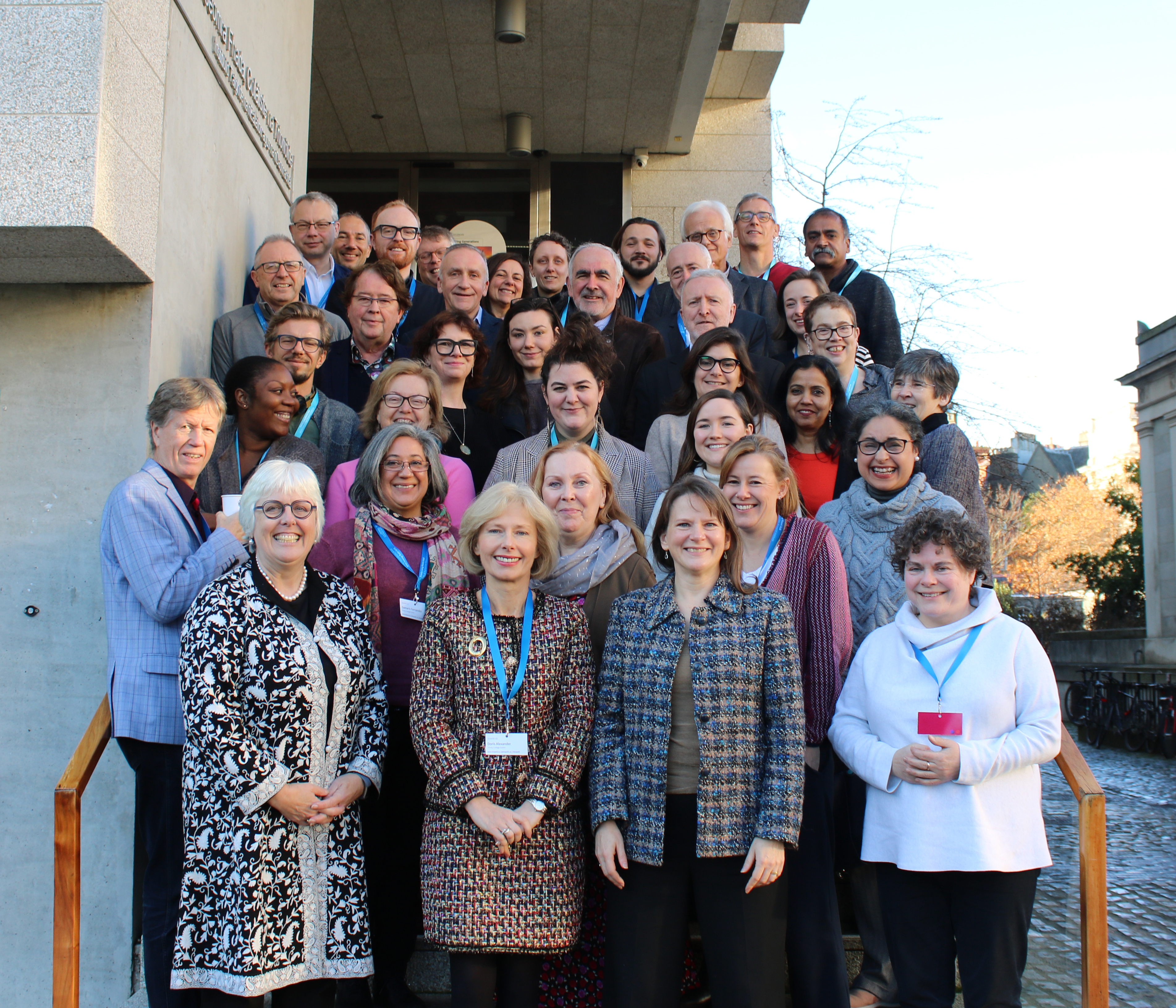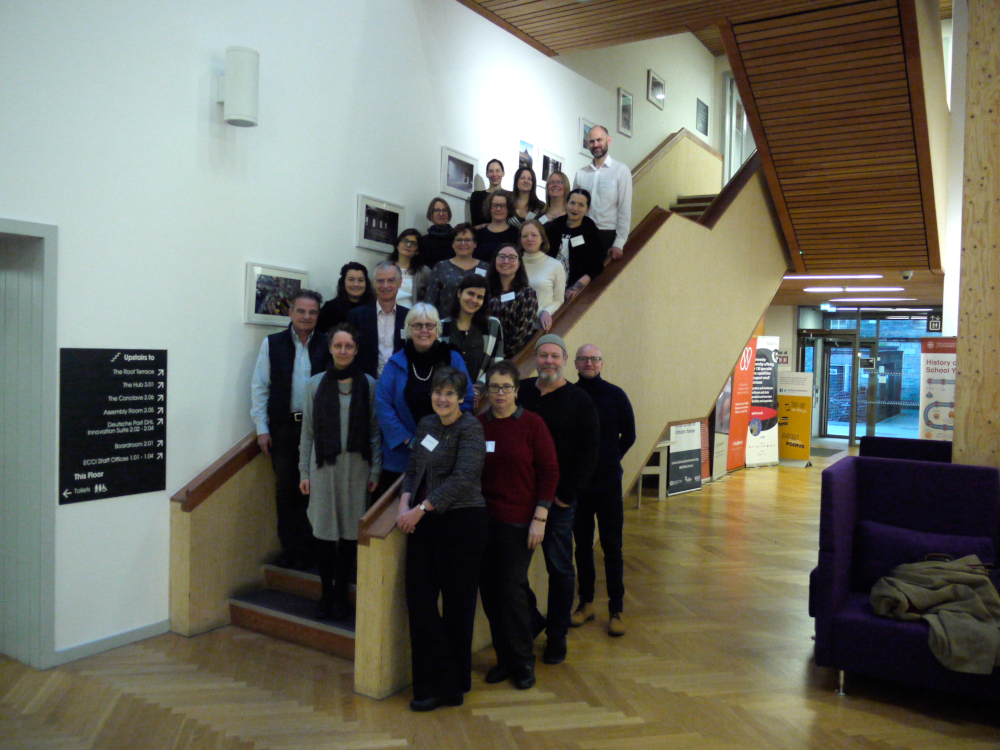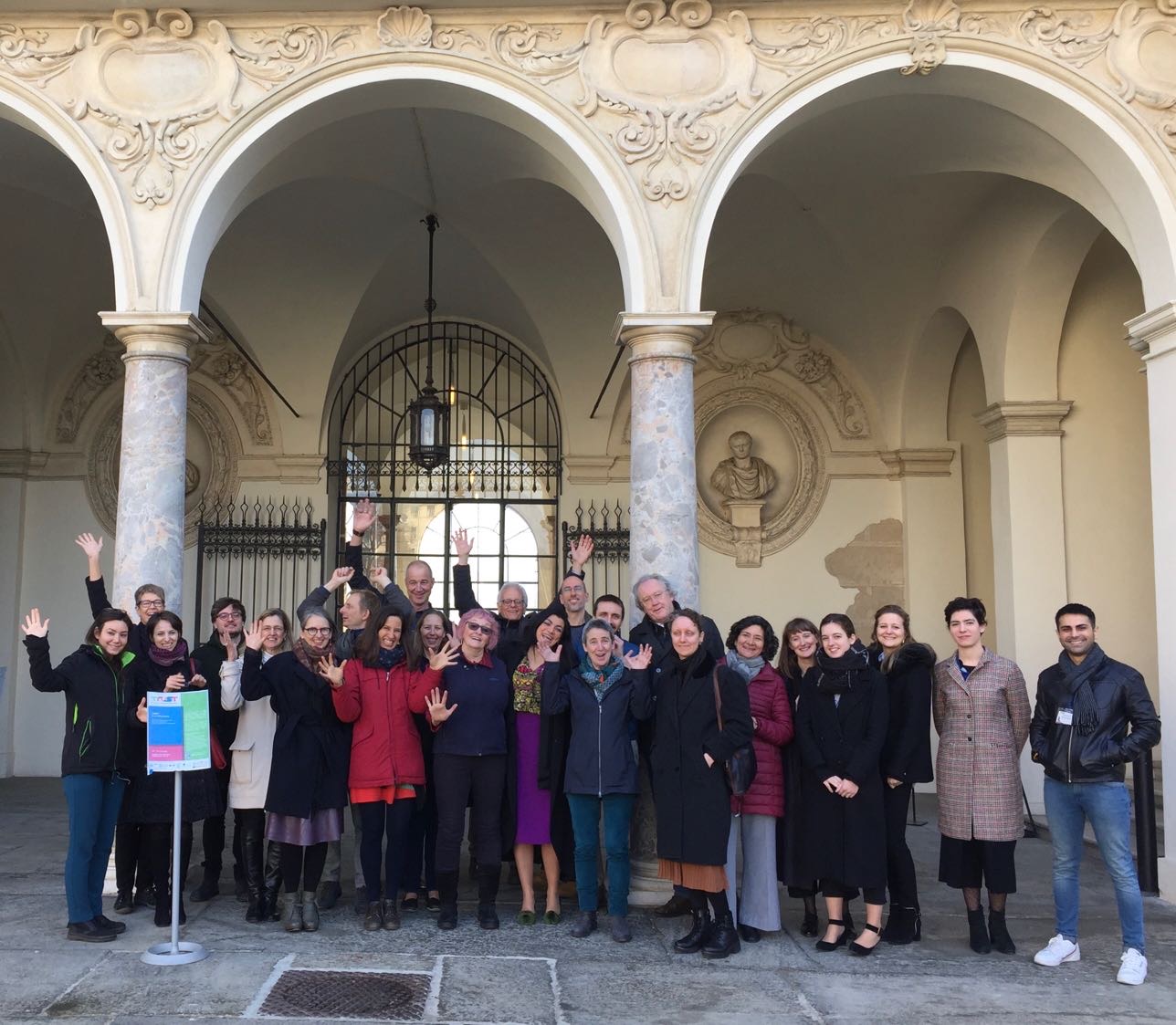SHAPE-ID: Shaping interdisciplinary practices in Europe

Project Update
SHAPE-ID Expert Panel
We are delighted to confirm an impressively strong and diverse Expert Panel, whose role will be to validate, refine and inform SHAPE-ID's final toolkit and recommendations. The panel is drawn from across our stakeholder groups, including senior academic researchers from a range of disciplines, experts in inter- and transdisciplinary research, representatives from policy making and funding bodies, research performing organisations, industry and civil society organisations. You can view all profiles here.
Literature Review
In late 2019 we published a preliminary report on the findings emerging from our literature review, which sought to disentangle understandings of inter- and transdisciplinary research present in the academic and policy literature on the subject and identify the factors that can help or hinder such research. The academic literature reveals heterogeneous understandings of inter- and transdisciplinarity, reflecting a diversity of practice and expectations across disciplines and communities. This contrasts with a frequent assumption in policy literature that the terms are well understood, and merits consideration when drafting funding calls or position papers calling for inter- or transdisciplinary approaches.
We also present a list of 25 factors that can help or hinder inter- and transdisciplinary research and find from the literature that these factors are dynamic and contextual, with many having the potential to be either enablers or hindrances. This suggests the potential to transform hindering factors into enabling factors if they are correctly identified at the right phase of a research project.
You can read our summary of the report in our blog post here and the full report is available here (opens PDF).
We will shortly be publishing the final results of our literature review along with a policy brief based on its findings and are planning a special issue of this newsletter and a webinar in the coming months to share these.
Survey
In February 2020 we completed work on a survey with inter- and transdisciplinary researchers in Europe, complemented by interviews with policy makers and funders, to explore best practices in inter- and transdisciplinary research. The report will be available soon and we’ll present more details on it in our upcoming special issue of this newsletter. In the meantime, some highlights are available on our blog here.
Learning Case Workshops
SHAPE-ID has designed a series of thematic workshops to enable stakeholders to jointly explore best and poor practices of inter- and transdisciplinary research and co-produce recommendations for AHSS integration. Some of the workshops will focus on broader questions and challenges, while others will address specific themes relevant to societal challenges. The first three of these workshops have already taken place (see more below):
- Dublin, December 2019 (Trinity College Dublin): Positioning the Arts and Humanities as leaders or equal partners in societal challenges research
- Edinburgh, January 2020 (University of Edinburgh): Bringing an environmental humanities lens to bear on interdisciplinary collaboration among the AHSS disciplines and between AHSS and STEMM disciplines
- Turin, February 2020 (ISINNOVA in collaboration with Politecnico di Torino): Inter- and transdisciplinary educational models and approaches that support sustainable urban transformation
- Bilbao (ISINNOVA in collaboration with University of Deusto): Scenarios of collaborative learning, working and living with machines and social innovation challenges
- Warsaw (IBL PAN): Streamlining digital humanities research and infrastructure in the cultural heritage domain
- Zurich (ETH Zurich in collaboration with td-net): Intersections, interfaces or reconfigurations? Arts and Humanities integration in inter- and transdisciplinary research
As our full report on the outcomes and lessons from the workshop series will be delayed, we are preparing a working paper on the outcomes of the first three workshops and will make this available in the coming months. In the meantime we will publish some additional blog posts on the outcomes of the first three workshops (follow SHAPE-ID on Twitter or Facebook to keep informed of these as they come out!)
Dublin Workshop: Arts and Humanities Leading Societal Challenges Research
 We were delighted to host the first workshop in Dublin on 2-3 December 2019. Over an inspiring two days, a highly engaged group of researchers, policy makers, funders and experts from the cultural sector and industry joined the SHAPE-ID team at the Trinity Long Room Hub Arts & Humanities Research Institute at Trinity College Dublin to tackle the question of how Arts and Humanities disciplines can position themselves as leaders or equal partners in research addressing societal challenges.
We were delighted to host the first workshop in Dublin on 2-3 December 2019. Over an inspiring two days, a highly engaged group of researchers, policy makers, funders and experts from the cultural sector and industry joined the SHAPE-ID team at the Trinity Long Room Hub Arts & Humanities Research Institute at Trinity College Dublin to tackle the question of how Arts and Humanities disciplines can position themselves as leaders or equal partners in research addressing societal challenges.
We started with a series of inspiring presentations from Dr Susan Flavin, Prof Barry C Smith, Dr Marcus Collier, Dr Kavita Sivaramakrishnan and Dr Jennifer Edmond, on their experiences doing inter- and transdisciplinary research. On Day 2 we were fortunate to have Doris Alexander present on the European Commission’s new mission-oriented research and innovation plans. Participants then collaborated in smaller groups to brainstorm around the potential of AH leadership in societal challenges research, the obstacles and practical steps to improving this, and what missions in areas such as climate change, healthy ageing and the crises of democracy might look like with significant AH involvement.
Some of the key insights emerging from the workshop included:
- Reframing policy priorities to include societal values and involve AHSS perspectives in understanding, framing and defining problems.
- Supporting and valuing disciplines, as strong foundations in disciplinary expertise are critical in building interdisciplinary collaborations with equal participation from different partners.
- Incentivising interdisciplinary work so that it benefits rather than hinders research careers, and building capacity for AHSS disciplines to participate in interdisciplinary work.
- Acknowledging the significant amount of time it takes to build mutual understanding and trust in interdisciplinary collaborations. Small-scale seed funding as well as larger research infrastructures can contribute to the conditions for this.
You can read more about the workshop here and explore some key insights emerging from the discussion here.
We also took the opportunity to ask Arts and Humanities Early Career Researchers in the Long Room Hub to produce posters linking their research to one or more of the Sustainable Development Goals. You can see the fascinating posters they produced here.
Edinburgh Workshop: Environmental Humanities
 The second SHAPE-ID workshop, organised at the University of Edinburgh on 20-21 January 2020 by our partners Professor Catherine Lyall and Dr Isabel Fletcher, was a great success. We spent two days with Environmental Humanities scholars, policy makers and funders, exploring what specific contributions the humanities can and do make to societal challenges research related to environmental concerns in the context of inter- and transdisciplinary research. We kicked off with some excellent presentations from Dr Anna Antonova, Professor Naomi Sykes and Professor Dolly Jørgensen on their experiences of doing interdisciplinary research at various scales, from doctoral research to large-scale collaborative research and Art-Science collaborations.
The second SHAPE-ID workshop, organised at the University of Edinburgh on 20-21 January 2020 by our partners Professor Catherine Lyall and Dr Isabel Fletcher, was a great success. We spent two days with Environmental Humanities scholars, policy makers and funders, exploring what specific contributions the humanities can and do make to societal challenges research related to environmental concerns in the context of inter- and transdisciplinary research. We kicked off with some excellent presentations from Dr Anna Antonova, Professor Naomi Sykes and Professor Dolly Jørgensen on their experiences of doing interdisciplinary research at various scales, from doctoral research to large-scale collaborative research and Art-Science collaborations.
Participants then engaged in co-design activities discussing the development of interdisciplinary research projects with environmental humanities involvement, critiquing funding calls and proposing appropriate peer review processes.
Some key areas for improvement in efforts to integrate Arts and Humanities perspectives into inter- and transdisciplinary research on environmental challenges were identified:
- Writing the call: how calls are written is critical to promoting the inclusion and integration of different disciplinary perspectives;
- Application processes: a two-stage application process involving an initial proposal, followed by an invited full proposal, may encourage more risk-taking;
- Peer review: innovative IDR/TDR proposals need suitable evaluators, which requires academics to sign up as reviewers. There are currently too few AH academics doing so.
Read more about the workshop in our blog post here.
Turin Workshop: Urban Sustainability Education
 The third SHAPE-ID workshop took place in Turin on 17-18 February – fortunately just before the COVID-19 crisis erupted in Northern Italy – and was a collaboration with the TrUST project (Transdisciplinarity for Urban Sustainability Solutions) at Politecnico di Torino. Hosted at the beautiful Valentino Castle, the two-day event brought educators and researchers together to explore inter- and transdisciplinary educational models and approaches that support sustainable urban transformation.
The third SHAPE-ID workshop took place in Turin on 17-18 February – fortunately just before the COVID-19 crisis erupted in Northern Italy – and was a collaboration with the TrUST project (Transdisciplinarity for Urban Sustainability Solutions) at Politecnico di Torino. Hosted at the beautiful Valentino Castle, the two-day event brought educators and researchers together to explore inter- and transdisciplinary educational models and approaches that support sustainable urban transformation.
The workshop opened with a series of keynote presentations on new learning paradigms and best practice cases for sustainability education, from primary schools to third level campuses, from Dr Jo-Anne Ferreira, Professor Julie Davis and Maria Garcia Alvarez.
In the interactive session of the workshop we explored a variety of different approaches – using individual and group writing exercises on Day 1 to generate ideas and more collaborative group activities to co-design research and innovation missions around urban sustainability education on Day 2. Sessions were beautifully captured in visual form by Caterina Barioglio of Politecnico di Torino.
Missions focused on the role of universities in promoting urban sustainability and identified a number of key areas for action:
- Enabling just and resilient active urban communities: A multifaceted strategy for stakeholder engagement must address all scales of urban governance, from neighbourhood to national and European level, and involve political and municipal authorities, civil society organisations, students and teachers. A toolbox of successful initiatives and training for facilitation and for reorganising governance structures is needed.
- Universities serving sustainable communities: Universities should provide a platform to bring together community to help build capacity for change.
- Empower a community of change to reorient HEIs towards sustainability: Universities need to build strong relationships with local communities and inspiring external leaders to inform their future development and identify and empower change agents within and outside of the institution.
You can read more about the workshop here and further insights are discussed in our blog post here.
Conferences & Events
Association for Interdisciplinary Studies
For the first time, the Association for Interdisciplinary Studies (AIS) held its annual conference outside of North America when it visited Amsterdam in October 2019. SHAPE-ID was represented by Catherine Lyall, Jack Spaapen and Bianca Vienni Baptista, as well as SHAPE-ID Expert Panel member Julie Thompson Klein. Dr Vienni Baptista convened a panel titled Shaping interdisciplinary practices: integration and best practices for research and policy, which attracted a lot of attention. The panel included SHAPE-ID’s Jack Spaapen and Olga Pombo from the Philosophy of Science department of the University of Lisbon and focused on the too often neglected topic of failure in collaborative research endeavours. You can read more here.
Interdisciplinarity Revisited
The Interdisciplinarity Revisited symposium, jointly organised by Humboldt-Universität zu Berlin, the foundation Stiftung Humboldt Forum im Berliner Schloss and the Volkswagen Foundation (3-4 October) brought together experts from across Europe and beyond to discuss the different concepts and definitions of interdisciplinarity and their application in higher education.
SHAPE-ID was represented by Catherine Lyall (University of Edinburgh) and Bianca Vienni Baptista (ETH Zurich), who was awarded a travel grant to present a poster and lightning talk on preliminary results emerging from the SHAPE-ID literature review.
Horizon 2020 Opportunities for Social Sciences and Humanities (Webinar)
Dr Bianca Vienni Baptista (ETH Zurich) introduced SHAPE-ID as part of a webinar organised by Euresearch, the Swiss guide to European research and innovation, on 16 October 2019. The webinar was led by Dr Joël Graf, Swiss National Contact Point (NCP) for Social Sciences and Humanities, Security and Science with and for Society, who discussed opportunities for Social Sciences and Humanities stakeholders (academics, NGOs, companies etc.) in European funding programmes, with a focus on collaborative research projects in the Societal Challenge 6 Work Programme.
Unleashing the Potential of SSHA
Dr Doireann Wallace, SHAPE-ID Project Manager, was invited to present on the knowledge exchange activities of the Trinity Long Room Hub and its various projects, including SHAPE-ID, at Unleashing the Potential of SSHA, a workshop hosted by Stifterverband and Heinz Nixdorf Stiftung in Berlin to address the challenge of integrating the Arts, Humanities and Social Sciences into professional knowledge exchange practices in Higher Education Institutions.
What's Next?
Like everyone we’re adjusting to the sudden changes brought by the COVID-19 pandemic. The bad news is that we’ve had to postpone three of our learning case workshops, which we were really looking forward to running in March, April and May. We hope these can take place in September or October 2020 – whether in person if travel is possible by then, or if not in a revised virtual form.
In the meantime, we are planning to take this opportunity to increase our dissemination activities. We are just completing the final outputs form Work Package 2 (literature review and survey) and will be finding ways to share the insights and recommendations from this work over the coming months, including our special issue of this newsletter and a webinar.
We will also be sharing more insights from the three workshops we’ve already run through a series of blog posts and developing a working paper synthesising these preliminary results over the next few months. We hope this will also culminate in a special edition of the newsletter to keep you updated.
Our next consortium meeting was planned to take place in Warsaw in April 2020 and will now take place online.
Recommended Resources
In our last newsletter we listed some upcoming events that may be of interest. Since a great many events scheduled to take place in the coming months have been cancelled, we’ve decided to share some useful resources and tools for inter- and transdisciplinary collaboration instead.
- SHAPE-ID blog: catch up on our older blog posts here. In addition to reflections on our report and workshops, you can read Jane Ohlmeyer's defense of the Arts and Humanities at the EU R&I Days last September and Catherine Lyall's reflections on her new book on interdisciplinary careers. We welcome your comments!
- Free online course ‘Partnering for Change: Link Research to Societal Challenges’: this fantastic Massive Open Online Course (MOOC) hosted by Future Learn focuses on exploring methods and tools for transdisciplinary research. It started on 30th March 2020 and you can still join! See https://www.futurelearn.com/courses/partnering-for-change
- The Integration and Implementation Insights (i2insights) blog: a community blog for researchers to share “concepts and methods for understanding and acting on complex societal and environmental problems”. See https://i2insights.org/
- Td-net toolbox: td-net have an excellent online resource including tools for facilitating collaboration and overcoming barriers at many different points in a research project lifecycle. See https://naturalsciences.ch/topics/co-producing_knowledge/methods/td-net_toolbox
- ITD Alliance: a new international network with the aim of connecting networks, associations, institutions and individuals interested in inter- and transdisciplinary research for addressing complex problems and questions. You can join at http://www.itd-alliance.org/
- Webinar guide: New to webinars? Us too! If you use Zoom this is particularly useful but it also provides a good overview of the different roles involved in webinars. https://support.zoom.us/hc/en-us/articles/360000252726-Roles-in-a-webinar
Recommended Recent Publications
There have been lots of interesting new publications on inter- and transdisciplinarity and AHSS integration in recent months. Here are a few of our recommendations:
- Bammer, G., O’Rourke, M., O’Connell, D. et al. (2020). Expertise in research integration and implementation for tackling complex problems: when is it needed, where can it be found and how can it be strengthened?. Palgrave Commun 6(5). https://doi.org/10.1057/s41599-019-0380-0
- Bothwell, E. (2020). Is interdisciplinary research really the best way to tackle global challenges? Times Higher Education 13 February 2020. Available at: https://www.timeshighereducation.com/features/interdisciplinary-research-really-best-way-tackle-global-challenges
- Brom, F. (2020). For the humanities to play a stronger role in public policy making, they must move from individual to institutional engagement. LSE Impact Blog 13 January 2020. https://blogs.lse.ac.uk/impactofsocialsciences/2020/01/13/for-the-humanities-to-play-a-stronger-role-in-public-policy-making-they-must-move-from-individual-to-institutional-engagement/
- Global University Network for Innovation (GUNI) (2019). Humanities and Higher Education: Synergies between Science, Technology and Humanities. Available at: http://www.guninetwork.org/report/higher-education-world-7
- Irish Humanities Alliance. (2019).The Arts, Humanities and Social Sciences in Horizon Europe: Conference Report. Available at: https://www.irishhumanities.com/assets/Uploads/AHSS-in-Horizon-Europe-FINAL.pdf
- Lyall, C. (2020). Facilitating serendipity for interdisciplinary research. i2insights blog 21 January 2020. Available at: https://i2insights.org/2020/01/21/serendipity-for-interdisciplinarity/
- Matthews, D. (2019). What is on the horizon for European research funding? Times Higher Education 28 November 2019. Available at: https://www.timeshighereducation.com/features/what-horizon-european-research-funding
- Research Evaluation 29(1): Special Section: Societal Impact in the Social Sciences and Humanities. Available at: https://academic.oup.com/rev/issue/29/1
- Woiwode, H. and Froese, A. (2020). Two hearts beating in a research centers’ chest: how scholars in interdisciplinary research settings cope with monodisciplinary deep structures, Studies in Higher Education. https://doi.org/10.1080/03075079.2020.1716321

